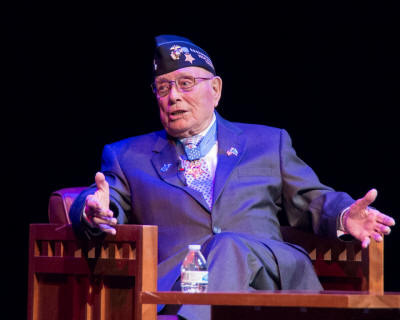|
 Memorial
Day memories Memorial
Day memories
Medal of Honor recipient says his decoration belongs to those who
never made it home
By Dr. Mark DePue
 Send a link to a friend
Send a link to a friend
[May 23, 2020]
It was February 23, 1945, when Corporal
Hershel “Woody” Williams of the 3rd Marine Division earned an
honored place in Marine Corps history. His unit was fighting its way
north on a tiny patch of land known as Iwo Jima. After only three
days of combat, his company of 275 Marines now had only 17
effectives. Of the seven flamethrower operators in the unit, Woody
was the only one still in the fight.
|
|
 Their situation was desperate when the company
commander gathered the remnants of his command together in a shell
crater. Could Woody take out some of the enemy pillboxes that were
pinning them down, the commander asked him. “I’ll try,” Woody
replied. Their situation was desperate when the company
commander gathered the remnants of his command together in a shell
crater. Could Woody take out some of the enemy pillboxes that were
pinning them down, the commander asked him. “I’ll try,” Woody
replied.
.jpg)
Description automatically generatedFew targets on the battlefield
were more conspicuous and foreboding to the Japanese than a Marine
with a flamethrower strapped on his back. Four Marines were chosen
to support Woody, tasked to provide suppressive fire so that he
could crawl close enough to unleash the flamethrower’s deadly
liquid.
“During the course of four hours,” Woody explained during a December
2019 interview, “time didn’t have any meaning at all. [In] the
course of four hours, I took one flame thrower with me when I first
started, and I got five more somehow, and eliminated seven … of
those pillboxes.”
For his actions that day, Woody received the Medal of Honor, the
nation’s highest medal for valor. Two of the four Marines sent out
to protect him died in the process, and the other two were wounded.
Here is how Woody’s award citation reads.

“Quick to volunteer his services when our tanks were maneuvering
vainly to open a lane for the infantry through the network of
reinforced concrete pillboxes, buried mines and black, volcanic
sands, Corporal Williams daringly went forward alone to attempt the
reduction of devastating machine-gun fire from the unyielding
positions. Covered only by four riflemen, he fought desperately for
four hours under terrific enemy small-arms fire and repeatedly
returned to his own lines to prepare demolition charges and obtain
serviced flame throwers, struggling back, frequently to the rear of
hostile emplacements, to wipe out one position after another.
[to top of second column] |

“On one occasion he daringly mounted a pillbox to
insert the nozzle of his flame thrower through the air vent, kill
the occupants and silence the gun; on another he grimly charged
enemy riflemen who attempted to stop him with bayonets and destroyed
them with a burst of flame from his weapon.”
Only Woody survived the experience unscathed. Two weeks later he was
also wounded after sprinting forward under intense enemy fire. He
dove into a shallow depression not deep enough for his entire body
and took a piece of shrapnel in his exposed leg.

We rightly focus on the heroic deeds of people like Woody. But for
his part, he would rather have us remember those equally brave souls
who guarded him while he wielded the flamethrower, a job for which
two of them paid with their lives.
Woody remembers well the day he received the Medal of Honor from
President Harry S. Truman in a special ceremony at the White House.
It was a thrill that a country boy from Quiet Dell, W. Va., will
never forget, but more important to him was what the Commandant of
the Marine Corps, General A. A. Vandergrift, himself a Medal of
Honor recipient, told him the next day.
“’That medal does not belong to you. It belongs to all those Marines
who did not get to come home’,” Woody recalls General Vandergrift
saying. The general also told him, “’Don’t ever do anything that
would tarnish that medal.’”
Woody has spent the rest of his life striving to live up to those
words, always remembering the other men who died protecting him, and
the 400,000 other men and women of his generation who made the
ultimate sacrifice for our freedoms today.
Woody Williams, at 96, is the last surviving Iwo Jima Medal of Honor
recipient. He now travels the country talking about his World War II
experiences, inspiring audiences wherever he goes.
Mark DePue is the Director of Oral History at the Abraham Lincoln
Presidential Library and Museum. You can listen to Woody’s entire
interview at
www.oralhistory.illinois.gov |